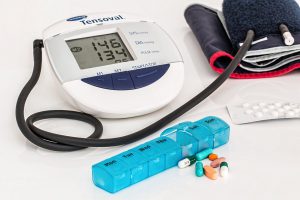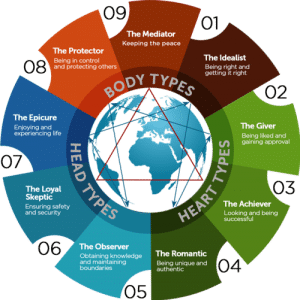It’s happening again: you’re overwhelmed with everything you’ve got on your plate. You’re running late, you have to drop your kids off at school or their extracurricular activities, and on top of that, you have work and chores to get done. All of these are just some of the stressors that most people have piled on them every day, and they can result in physical symptoms of stress like daily headaches, back pain, neck pain day, or just muscle tension at the end of the day. April is Stress Awareness Month, so find out just how stress takes its toll on your body, and how you can manage it, so you don’t have to live with the way that stress affects your health.
How Does Stress Affect Your Physical Health?
Stress doesn’t just take a toll on your mental health, it can also cause actual, physical symptoms. Just take a look at how stress affects each of these areas of your body:

Musculoskeletal System
When you’re stressed, your muscles tense up. This is your body’s way of guarding against injury and pain, so in a way, your muscles are always on guard and tensed when you’re stressed. You might find that you have tightness in your neck or back when you’re stressed, or even that you have tension headaches or migraines, which are associated with chronic muscle tension in the shoulders, neck, and head.
Respiratory System
Your body has other ways of dealing with stress other than tensing up. You might find that stress and other emotions present as respiratory symptoms, such as shortness of breath and rapid breathing. This happens because stress can constrict the airway between the nose in the lungs, and even cause a panic or asthma attack.
Cardiovascular System
Stress can lead to issues in your cardiovascular system, because it increases your heart rate, creating stronger contractions of the heart muscle. Blood vessels, which direct your blood to the large muscles and the heart, dilate, increasing the amount of blood pumped to these parts of the body and elevating your blood pressure. This is the same response you’ll have as when you’re in an extreme fight or flight situation, so chronic stress can contribute to long-term problems for the heart and blood vessels, leading to possible hypertension, heart attack, or stroke.
Endocrine System
During times of stress, the hypothalamus, which is a collection of nuclei that connects the brain and the endocrine signals, and the pituitary gland produce a hormone that increases the production of cortisol. This chemical can provide the energy required to deal with the stress until it has passed. But if you’re dealing with chronic stress, you could end up with impaired communication between the immune system and brain. Over a long period of time, this impaired communication can lead to physical and mental health conditions including chronic fatigue, depression, diabetes, and more.

Gastrointestinal System
How does stress affect your gut? Well, stress is associated with changes in gut bacteria, which can influence your mood. Stress also affects how your brain and gut communicate, and can trigger pain, bloating, and other discomforts in your stomach. You might even find yourself eating more or less than usual when you are stressed, having heartburn or acid reflux, vomiting, or being more bloated or uncomfortable than usual. Stress can also affect how you digest food and what nutrients the intestines absorb.
Nervous System
The nervous system comprises the brain, spinal cord, and autonomic and somatic nervous systems. The autonomic nervous system (specifically what’s known as the sympathetic nervous system, or SNS) has a direct role in the physical response to stress, contributing to what is known as the “fight or flight” response. The body shifts its energy resources towards the fight or the flight, with the SNS signaling the adrenal glands to release hormones called adrenalin and cortisol. These hormones can cause your heart to beat faster, your respiratory rate to rise, the blood vessels in your arms and legs to dilate, your digestive process to change, and glucose levels (sugar energy) in the bloodstream to increase to deal with the emergency.
Your body is supposed to go back to a normal state after the stress has passed, but chronic stress can result in a long-term drain on the body, since all of these reactions cause wear and tear on all of your body’s systems.
Reproductive system
Stress can take a toll on both the male and female reproductive systems. It can affect testosterone production over time, which will result in a decline in sex drive or libido. It can even cause erectile dysfunction or impotence in men, as well as impact sperm production.
In the female reproductive system, stress can affect menstruation among adolescent girls and women. It can result in absent or irregular menstrual cycles, more painful periods, and changes in the length of the menstrual cycle. It can also have an impact on a woman’s ability to conceive, as well as her health during pregnancy and postpartum.
Managing Stress
The best thing that you can do for your mental and physical health is to find ways to manage and take control of the stress in your life. This could be working out, meditating, getting a good amount of sleep every night, or just having a great support system – what’s most important is that you take the time to create these habits. If you feel that stress is taking over your life and affecting your health, though, it is important to seek medical attention, whether from your primary care physician, or a psychologist, who can help you with strategies to manage your stress.
EZ can help you find a plan that covers all of your medical needs when seeking help. We offer a wide range of health insurance plans from top-rated insurance companies in every state. And because we work with so many companies and can offer all of the plans available in your area, we can find you a plan that saves you a lot of money, even hundreds of dollars, even if you don’t qualify for a subsidy. There is no obligation, or hassle, just free quotes on all available plans in your area. To get free instant quotes, simply enter your zip code in the bar above, or to speak to a local agent, call 888-350-1890.













